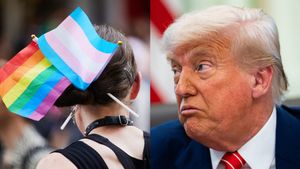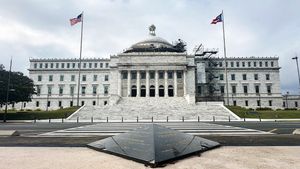At least two counties in West Virginia are prepared to issue marriage licenses to same-sex couples today, after bipartisan leadership in the state announced that they will stop defending the state's ban on marriage equality in the wake of pro-equality rulings in federal district court.
Matt Murphy, a local government reporter with the Charleston Daily Mail, tweeted out these photos Thursday afternoon confirming that Kanawha County has amended its marriage application forms to read "Applicant 1" and "Applicant 2" rather than "Groom" and "Bride."
Murphy further reports that Cabell and Nicholas counties are also accepting marriage applications from same-sex couples, while the state's 52 other counties are still seeking guidance or not yet issuing licenses. Counties have until October 14 to begin issuing marriage licenses to same-sex couples, according to another Daily Mail reporter.
West Virginia attorney general Patrick Morrisey, a Republican, pointed to recent action by the Supreme Court to let stand the federal Fourth Circuit's pro-equality ruling in a Thursday statement explaining why his office will stop defending West Virginia's ban on same-sex marriage.
"On Oct. 6, 2014, the U.S. Supreme Court decided it would not take up the decision by the U.S. Court of Appeals for the Fourth Circuit to set aside Virginia’s law regarding same-sex marriage," reads the statement posted on the website for the Office of the West Virginia Attorney General. "By refusing to consider the appeal, the Supreme Court has caused the Appeals Court's decision to become final and binding on West Virginia. While we disagree with the Supreme Court’s decision to allow the Fourth Circuit’s opinion to stand and believe it improperly displaces state and local decision-making, we will respect it."
The attorney general, who had until this point defended his state's voter-approved ban on same-sex marriage in a federal lawsuit seeking to overturn that policy, went on to confirm that he will end the state's defense in light of this week's legal developments. The suit seeking marriage equality in West Virginia had been placed on hold pending final resolution in the federal case against neighboring Virginia's ban, advocacy group Freedom to Marry reports. On Tuesday, the U.S. Supreme Court declined to review that case, making the Fourth Circuit's ruling in favor of marriage equality in Virginia final.
"As the state’s Attorney General, it is my duty to defend state laws that have been passed by the state Legislature and are consistent with the Constitution," wrote Morrisey. "We have discharged this duty faithfully. In the upcoming days, we will now seek to bring to a close the pending litigation over West Virginia’s marriage laws, consistent with the Fourth Circuit’s now-binding decision."
However, the attorney general's statement stressed that his office dropping its defense of marriage discrimination will not, in and of itself, bring marriage equality to West Virginia.
"Neither the Attorney General nor the two named county clerks [in the federal lawsuit] have the power to change uniform state marriage forms and procedures," stated Morrisey. "Only the State Registrar may alter state marriage forms, and the Secretary of State’s Office has authority over marriage celebrants and their ability to solemnize marriages."
While just three counties are currently issuing marriage licenses to same-sex couples at press time, West Virginia's Democratic Governor confirmed that he has instructed state agencies to proceed in making the necessary changes to allow same-sex couples in the state to marry.
In a statement of his own Thursday afternoon, Gov. Earl Ray Tomblin confirmed that he will not stand in the way of marriage equality arriving in West Virginia.
"As the attorney general stated today, recent rulings by several federal courts, combined with the refusal of the U.S. Supreme Court to hear this issue, make it clear that laws banning same-sex marriage have been declared unconstitutional," stated Tomblin. "I do not plan to take any actions that would seek to overturn the courts’ decisions. West Virginia will uphold the law according to these rulings, and I have directed state agencies to take appropriate action to make that possible."


























































































































